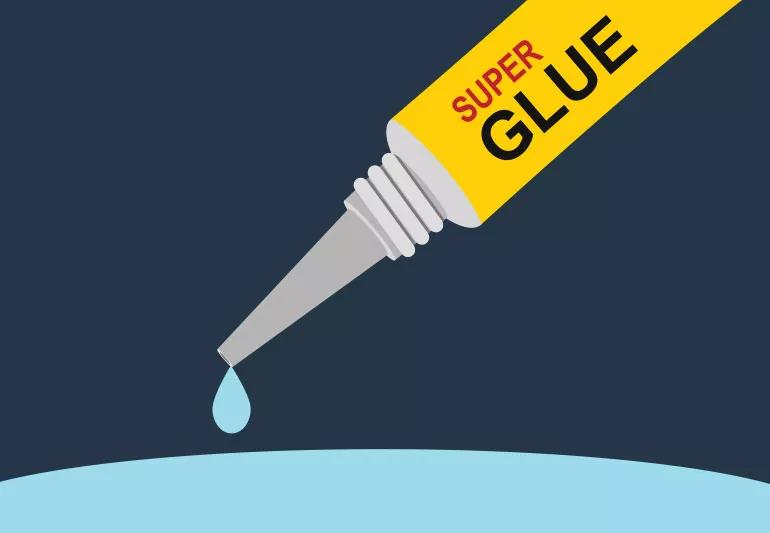Get unstuck with a few home remedies

Image content: This image is available to view online.
View image online (https://assets.clevelandclinic.org/transform/9308fa62-970d-4ae0-8e75-f18c1ddd6d9e/superGlue1-1161391038_770x533_jpg)
A drop of super glue coming out of a tube
Super glue can fix almost anything — but it’s not so useful when you glue your fingers together.
Advertisement
Cleveland Clinic is a non-profit academic medical center. Advertising on our site helps support our mission. We do not endorse non-Cleveland Clinic products or services. Policy
The powerful adhesive cyanoacrylate, found in super glue and similar products, doesn’t let go easily. But dermatologist John Anthony, MD, explains how to get super glue off your skin safely.
If your fingers are glued together, or your skin is glued to something else, don’t panic. You can usually get the glue off with one of these steps.
Advertisement
When it comes to removing super glue from your skin, patience is key. “Don’t try to pull the skin off forcefully or pick at it,” Dr. Anthony says. “You could injure the skin and end up with a painful blister. And don’t use sharp objects like razors, nails or knives.”
If you do break the skin when trying to remove super glue:
And finally, don’t use scrubs, pumice stones or other harsh abrasives to remove super glue. “These items can irritate and damage the skin, and the other methods work better,” Dr. Anthony says.
“Getting a small amount of super glue on the skin isn’t harmful to most people,” says Dr. Anthony. “But a few people are allergic to it. It can cause a skin reaction called contact dermatitis. The reaction shows up a few days after the exposure and looks like a poison ivy rash.”
And if you swallow super glue or get it on your face, don’t take any chances. “Super glue in or near your eyes, nose or mouth is a medical emergency,” Dr. Anthony says. “Contact a poison control center or go to the emergency room.”
If super glue doesn’t come off with soap, oils or acetone, and it’s not bothering you, wait a few days. As the skin sloughs off naturally, the glue will come off, too.
Super glue is powerful, so use it with care. Treat it like any household chemical and keep it out of reach of children.
Advertisement

Sign up for our Health Essentials emails for expert guidance on nutrition, fitness, sleep, skin care and more.
Learn more about our editorial process.
Advertisement
Although it could be used as a moisturizer, this new trend is not recommended
It’s a great disinfectant for around your home, but not for your skin
Changes in texture, smell, color and performance are signs it’s time to throw the cosmetic item away
Strengthening your skin barrier, simple routines and minimizing products are ongoing, popular trends
Moisturizing, running a humidifier and adjusting your showers may help keep itchiness and irritation at bay
Glycolic acid benefits skin tone, texture and pigmentation by exfoliating dead skin
Some gentle soap and warm water go a long way when you’re washing these cosmetic tools regularly
New formulas are less drying and contain water-based and skin-loving ingredients
Prioritize your health by managing stress, strengthening your social connections and getting quality sleep
Bolsters, blankets, pillows and blocks can offer extra support, stability and comfort
Allergies, postnasal drip, asthma or reflux could be to blame for a cough that won’t quit